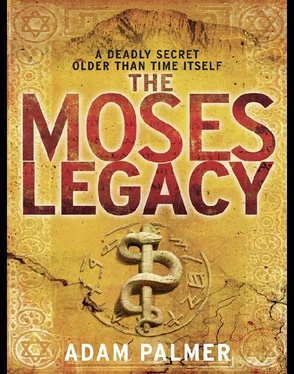Adam Palmer - The Moses Legacy
Здесь есть возможность читать онлайн «Adam Palmer - The Moses Legacy» — ознакомительный отрывок электронной книги совершенно бесплатно, а после прочтения отрывка купить полную версию. В некоторых случаях можно слушать аудио, скачать через торрент в формате fb2 и присутствует краткое содержание. Жанр: Триллер, на английском языке. Описание произведения, (предисловие) а так же отзывы посетителей доступны на портале библиотеки ЛибКат.
- Название:The Moses Legacy
- Автор:
- Жанр:
- Год:неизвестен
- ISBN:нет данных
- Рейтинг книги:4 / 5. Голосов: 1
-
Избранное:Добавить в избранное
- Отзывы:
-
Ваша оценка:
- 80
- 1
- 2
- 3
- 4
- 5
The Moses Legacy: краткое содержание, описание и аннотация
Предлагаем к чтению аннотацию, описание, краткое содержание или предисловие (зависит от того, что написал сам автор книги «The Moses Legacy»). Если вы не нашли необходимую информацию о книге — напишите в комментариях, мы постараемся отыскать её.
The Moses Legacy — читать онлайн ознакомительный отрывок
Ниже представлен текст книги, разбитый по страницам. Система сохранения места последней прочитанной страницы, позволяет с удобством читать онлайн бесплатно книгу «The Moses Legacy», без необходимости каждый раз заново искать на чём Вы остановились. Поставьте закладку, и сможете в любой момент перейти на страницу, на которой закончили чтение.
Интервал:
Закладка:
Daniel saw the pain in Tsedaka’s eyes as he spoke.
‘However, when he returned he was hostile to our ancestors, regarding them as interlopers. Our ancestors tried to befriend the Judeans and even offered to help them rebuild their temple that had been destroyed by the Babylonians. But Ezra rejected their offer. He even refused to believe that our ancestors were Israelites at all. He claimed that they were migrants from a place in what is modern-day Iraq.’
‘Why did he do that?’
‘He was a determined man who rejected anything that seemed like compromise or weakness. He may well have been sincere. He introduced other reforms, such as forbidding intermarriage between Judeans and others.’
‘Oh, so it was the purity of blood thing,’ said Gabrielle with a sneer.
Daniel gave her a look to warn her off. The Samaritans too had strict rules about intermarriage, although they were now relaxing them slightly in order to repopulate and reduce the risk of genetic diseases.
‘Ever since that time, relations have been strained between us and the Judeans, or Jews as they are now called. If you look at the history of the way we were treated, it parallels the way in which Joseph was treated by his brothers and strangers. But we were also oppressed by Muslims during the Caliphate periods and by Christians during the Crusades. Having said that, things began to improve for us when Israel’s second president – Yitzhak ben-Zvi – encouraged the establishment of our community in Holon in 1954. He recognized and acknowledged our connection to ancient Israel.’
A rise in the background volume alerted them to the fact that something important was happening. It was nine-thirty and that meant they were about to start cooking. The men in charge of the operation picked up the wooden stakes with the carcasses, brought them over to the pits – six or seven to each pit – and then when the word went up they quickly impaled them vertically into the dirt floor of the pits. The pits were then sealed by a burlap-covered metal grate, which in turn was covered with mud to trap the heat.
At midnight, in accordance with tradition, the ovens would be opened up and each family would then take its roasted lamb home, where the meat would be devoured quickly. Anything not eaten that night had to be burned, just as in the ancient days of Moses. But that was some two and a half hours away.
The mood relaxed again as people settled in for the long wait. Daniel took advantage of the moment to move things on in his discussions.
‘The other thing that caught my attention was a sentence on the papyrus that referred to the “Sibolet stores built by my father”.’
‘Sibolet?’ the rabbi echoed.
‘Yes,’ said Daniel. ‘You see in early Proto-Sinaitic, they didn’t have a symbol for “sh”. And when they did want to make that sound, they used the same symbol as for the “s” sound.’
‘Your point being?’
‘That it may have something to do with the war between the Ephraimites and the Gileadites.’
‘It was essentially a civil war,’ said Tsedaka almost defensively. ‘Gilead was basically the tribes of Gad and Menasha. It was an internal war between brothers. That too was a very sad episode in Israelite history.’
‘I know. But there was a well-known incident in that war that has left a legacy on the English language. When the Ephraimites were losing, they tried to escape by pretending to be members of other tribes, in the hope of getting across the River Jordan. But if they were intercepted by the Gileadites, they were challenged to say the word Shi bolet.’
‘I know,’ said Tsedaka, meeting Daniel’s eyes, but giving little away as to his own thoughts.
‘And of course the reason they did that was because the Ephraimites couldn’t pronounce the “ sh” sound. So instead they said “Sibolet”. And as soon as they said that, they were identified as members of the tribe of Ephraim and killed on the spot.’
‘Pretty harsh,’ said Gabrielle with a wry smile.
Again Daniel was irritated at Gabrielle’s interruption, but Tsedaka seemed to take it all in his stride.
‘That’s the way it was in those days.’ He turned to Daniel. ‘But tell me about this lasting legacy on your language.’
‘Well, the word Shibboleth has been incorporated into the English language to mean any custom, phrase, collective memory or linguistic peculiarity that acts as a test of membership of a particular religion, social class, nationality, profession or group. And in fact that meaning has now been extended, so it can also refer to any belief, principle, or practice which some people hold in high esteem but others think of as false or at least out of date.’
‘I suppose you know that in our prayers we do pronounce the “sh” sound. Indeed, we do not pronounce the letter shin as anything other than sh.’
‘Then how can you be descended from the tribe of Ephraim?’ asked Gabrielle.
Tsedaka smiled. ‘I see we have a sceptic in our midst.’
Daniel seized upon the opportunity. ‘Well, maybe between us we can banish her scepticism, Rabbi Tsedaka.’
‘How?’
‘I was wondering if you have any documents in Proto-Sinaitic script – documents that might be used to prove your origins.’
‘We have old documents in Samaritan Hebrew and Aramaic that have been translated. But none of these goes back far enough to conclusively prove our history. But there are other texts that even our priests do not understand. However, to show them to a stranger would be a leap of faith as great as that taken by Nahshon.’
Daniel smiled at the analogy. When the fleeing Israelites reached the Sea of Reeds at the time of the Exodus, with the army of the pharaoh in hot pursuit, they moaned and wailed to Moses that he had brought them out into the desert to die. Then one of the Israelites, a man called Nahshon leapt into the water, thereby showing his faith in God. At that point, the waters parted.
‘My motive is both scholarship and friendship,’ said Daniel. ‘If you have any documents in the ancient script that pre-date the old Hebrew and Aramaic scripts, and if I can translate them, then perhaps I will be able to help you prove your origins.’
Tsedaka seemed to be wrestling with some inner conflict. Daniel remembered that even the name ‘Israel’ meant ‘wrestling with God’. He spoke again, desperate to persuade Tsedaka to let him see the manuscripts. ‘I know I am asking you to take me on trust. I wish I could prove to you that I have translated those other documents. Unfortunately the circumstances in which we came here makes that impossible. But you can check out my credentials. I am a genuine scholar of Semitic languages.’
Tsedaka smiled. ‘I do not have to check out anything. I know who you are well enough. I even knew your teacher, Professor Carmichael.’
Daniel was surprised at this. He looked over at Gabrielle.
‘I can tell you that there were two manuscripts older than the Torah that we had in the past, but we now only have one of them. The first – the one that is lost – is called Sefer Milhamot Hashem. ’
‘ The Book of the Wars of the Lord,’ Daniel translated.
‘It is actually quoted in the Bible,’ Tsedaka continued. ‘Numbers 21:14. The quotation contains a reference to the miracles at the Reed Sea and occurs just after the description of Moses and the fiery serpents.’
Daniel remembered his discussion with Carmichael, but said nothing.
‘But why is it lost?’ asked Gabrielle.
‘It was entrusted to the tribe of Menasha,’ Tsedaka explained. ‘And the tribe of Menasha had land on both sides of the River Jordan. It was to the eastern half of the tribe that the book was entrusted. But you have to understand that over the centuries we have lost many members, not only to wars and massacres but also to enforced conversion. Many of us converted to Islam and many of those converts inter-married. So The Book of the Wars of the Lord is now in the hands of the Bedul tribe.’
Читать дальшеИнтервал:
Закладка:
Похожие книги на «The Moses Legacy»
Представляем Вашему вниманию похожие книги на «The Moses Legacy» списком для выбора. Мы отобрали схожую по названию и смыслу литературу в надежде предоставить читателям больше вариантов отыскать новые, интересные, ещё непрочитанные произведения.
Обсуждение, отзывы о книге «The Moses Legacy» и просто собственные мнения читателей. Оставьте ваши комментарии, напишите, что Вы думаете о произведении, его смысле или главных героях. Укажите что конкретно понравилось, а что нет, и почему Вы так считаете.












